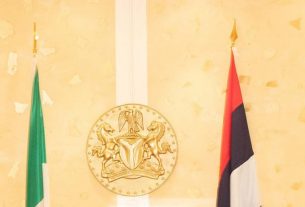By Lawal Ogienagbon
BY this time next week, the inauguration would have come and gone, President Muhammadu Buhari would lead the way as he and the governors, both returning and incoming, take their oath of office.
For the President and the returning governors, it would be their second and final four-year term, which will round off their constitutionally approved eight-year tenure in 2023. The May 29 Inauguration will be low key because the day will only be for the swearing in of the President and governors. There will be no pomp and ceremony as was the case in the past 19 years.
In the past, at least since the nation returned to democracy in 1999, May 29 was a high pedestal in the nation’s political calendar. It was observed as Inauguration and Democracy Day. Since it served that dual purpose, the day was marked with fanfare. The drums were rolled out at the national and state levels in celebration of democracy and the oath takers’ victory at the polls.
All that has changed with the adoption of June 12 as Democracy Day. June 12 is no ordinary date in the nation’s annals. What makes it significant is the June 12, 1993 presidential election, which is considered the freest and fairest poll in the country’s history. The late newspaper mogul, Bashorun M. K. O. Abiola, of the defunct Social Democratic Party (SDP) won the election hands down, but was never allowed to assume office. Former military president Ibrahim Babangida annulled the election and threw the nation into crisis.
The crisis consumed him as he was forced to step aside on August 27, 1993. The Interim National Government (ING), which he installed, was sacked by the late dictator, Gen Sani Abacha, who detained Abiola for four years after he declared himself president at Epetedo, Lagos, in his bid to reclaim his mandate. Abacha and Abiola died in controversial circumstances one after the order in a space of one month in 1998.
With the President taking his final oath of office on May 29, he and his party, the All Progressives Congress (APC) have another chance to fulfil their promise to the people. The people have seen how the President fared in his first term. His final four-year term is expected to be defining. Not many have good things to say about his first four-year term. To these people, the President did not meet Nigerians’ expectations. They wanted to see a President that will transform their lives in a twinkling of an eye. But that did not happen.
Really, the President and his party gave the citizenry the impression that things will change overnight on their coming to office. They promised CHANGE; the people took them on their word, expecting instant change. But such change does not come like instant coffee. If it were that easy, our country would have been transformed by now. What with the promise to ensure regular power supply within six months and statements such as any government that cannot guarantee that should simply pack and go within a few months! Those who talked like that now know better.
The party seemed to have spoken out of turn before coming to office and that came back to haunt it when it mounted the saddle. Its perception of what to do and the reality on ground were diametrically opposed. The rot left by their predecessor was endemic and the President and APC did not know this until May 29, 2015. After four years, it is expected that the President and his team should have devised means of overcoming the problems of governance. Nigerians, in the next four years of this administration, will not be interested in why it cannot discharge its obligations.
Of course, they are also tired of hearing government officials heaping the blame of everything that is wrong on the ‘’16 years misrule’’ of the Peoples Democratic Party (PDP), which was in power between 1999 and 2015. There will be no room for such talks in this coming dispensation. What the people are interested in as the government begins its second term is how it will improve their lot before the next elections in 2023. Its campaign slogan was Next Level meaning that it will move the people from their present position to the next. It is a promise to take them to greater heights. Next Level means promotion; it means better days ahead, a rosier future. Anything short of this in the next four years cannot be tagged Next Level.
The Buhari administration can deliver on its Next Level promise by facing the issue of governance squarely without blaming the previous government for every problem that rears its head. Government is a continuum no matter the change in the party at the centre. It is the beauty of democracy for power to change hands between parties. This is not a big deal. It happens elsewhere and it does not disrupt governance. The case should not be different here. A change in the party in power should not be an excuse for not delivering dividends of democracy to our long-suffering people.
Rather, it should be an impetus to win them over to become the party’s die-hard supporters based on its performance. A party that delivers will always win elections because the people will fall in love with it. But, if it does not deliver, it can never count on the people’s support. APC knows what to do if it wishes to remain in power longer than the years spent on the saddle by PDP. The people’s prayer is for the President to take them to the Next Level before he finally bows out of office in 2023.
The Nation





